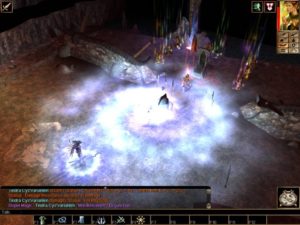Two and a half weeks never went by so quickly. My head feels crammed with new ways to track things in woods, new ways to kill goblins, new ways to move quietly over leaves…
The others have been busy, too, of course. Raven has been at one of the temples in Hochoch, while Mikael disappeared to some secret Druid place in the forest.
Ezekiel is babbling on about some parchment he found in an obscure library that mentioned the “God of gods.” He wants to find out more as soon as he can.
The Richfest in Hochoch was exciting; big towns do it differently than we did in Ertuli. Of course no celebration will be like your memories of how they did it in your childhood…
Tomorrow we start for Hommlet. It’s quite a hike, but hopefully the journey will go smoothly.
****
5th day of Reaping, Waterday
When we stopped for lunch, I noticed some strange tracks on the ground by the road – unlike any creature I’d ever heard about. Not comforting.
Not long afterward, we spotted a boy in a bright red shirt making his way toward us. He seemed to be trying to hide from something, but Mikael hailed him, and then he came up to us.
We exchanged the usual about where we were heading, and Mikael asked if the strange tracks were “his people.”
The boy said yes, and laughed. (He did a lot of laughing.)
Mikael smiled, too, and said they were the Wandering Folk, the Tzigane – and that all Druids have at least heard about them.
The boy wandered over to Raven and tried to swipe one of his daggers…but Raven caught his hand.
That made the boy laugh. (I’m not keen on all this laughing.)
Raven smiled and held one of the daggers out to the boy.
The boy laughed again and took it. “You’re strange Gorgio,” he said.
“Aren’t all Gorgio strange?” I asked.
He laughed (again) and said yes, and then he said that he liked Raven.
Reminds me of a brother of mine…
About that time, a little girl appeared, calling for “Nicolai.” She came up and asked the boy what he was doing.
“I’ve been working, Marta,” he said, tossing the dagger casually.
“If you were working, you wouldn’t be showing me,” she said. And she told him to come along.
He invited us to come with, so we headed off along the road. Mikael (and I) realized Nicolai probably hadn’t seen Nori, so he told her to stay in the trees out of sight. A giant, hairy spider can be a little off-putting at first.
After a ways, we split off from the road – but were still going with the trail of strange markings. (Whatever animal that is, I’m not sure I want to meet it.)
Finally, we reached a clearing with several bright-colored carriages or wagons, several horses, and men and women in clothes of all kinds of colors. (Those tracks aren’t anything like horse-hooves or wagon wheels…)
The boy introduced us as his friends, and introduced us to his uncle (also Nicolai). (The leader is a dark-haired man…doesn’t seem to like us. Not like I blame him, but keep your wits on…)
Uncle Nicolai seems like a decent fellow. He casually told us that the horses would be less nervous if our spider kept her distance…which is much calmer than that inn in Hochoch who told Mikael “no pets.”
The uncle is also a musician, and an impressive one. He asked for our story, so Ezekiel unloaded the whole saga of him (Ezie) getting killed.
As he listened, the minstrel kept thrumming his instrument (a lyre or mandolin, I think) and when it was done he sang the story back to us. So, setting poetry on the fly – that’s pretty impressive!
When he was done, he said he usually got paid for his songs…but it was our story he was singing, so how could we be expected to pay for that?
(Glad he saw it that way, since it’s a long way to Hommlet, and we might need what little cash we have.)
Raven went off to talk to one of the horses (yeah, apparently Monks can do that, now. He’s really excited about it) until the ladies called us all to the campfire for dinner.
These Tzigane people are very friendly. One blond-haired girl even tried to sit up against Ezekiel, but he smiled at her and scooted closer to Raven, so she stayed next to her brother or cousin or something.
A dog came through, and seemed to be having a deep conversation with Raven. Beside me, Mikael was watching them closely. I can see it doesn’t seem fair that a Monk can do something that a Druid can’t.
As we ate our stew, one of the women offered to read Ezekiel’s fortune if he “crossed her palm with silver” – so he gave her a gold piece (which is not silver) and she looked at his palm.
(I would make a lousy salesman. “Can I interest you in this fine leather jacket?” “Sure. Oh, you want me to pay for it? But you’re the one who brought it up!” Better stick with Rangering.)
She told him many things—
- remember the God of Gods’ rules
- he’ll go on a long journey, and face a demon (oik!)
- he’ll face ill health before reaching town (what a surprise!)
- a rich merchant at the full moon will help him
We sat around the fire all evening, until one by one we dropped off to sleep. I told Mikael I’d take first watch (setting a watch? OF COURSE. Who am I again?). Feels a lot like a party, what with sleeping in the open air and being guests “of honor,” but…well…you never know.
The firelight and the starlight are beautiful, though.
****
I must have dozed off because suddenly the dog was licking my face, and the fire had died down.
I sat up and thanked the dog, who went over to lay down by Raven (I’ll say this for Raven, he makes a splash with whoever he talks to).
About midnight, I woke Mikael up and lay down – and in the morning we were all alive and had all our belongings as far as I know.
The Tzigane started packing up, and Mikael hurried over to talk to the horse (apparently he prayed for Speak to Animals this morning, to show he wasn’t outclassed by the Monk). Raven also went over to the horses and helped with their care – maybe being able to talk to the horses helps you take care of them.
Ezekiel gave a string of pompous, flowery speeches about unexpected friendship and what-not. (Why don’t you just say “we think you’re all crooks, and are unexpectedly pleased to still have the clothes on our backs”? If that’s what you’re really thinking? Ezekiel…)
Little Nicolai gave Raven a hug good-bye, immediately after which Raven told me he’s missing another dagger.
Reminds me of a brother of mine…
Ezekiel gave the chief a gold piece…and after the chief decided to not be offended (I thought it was a toss-up for a moment there) he called for Little Nicolai. The boy appeared, steered by his mother, and they made him give Raven his dagger back.
Well, whatever else, it seems we’ve made a splash. I hope they enjoy talking about these “weird Gorgio” for a while.
(Oh, one of them told me about the tracks. Apparently it’s something they do to the ground so they can find each other in the woods, and recognize their own trails. Clever. I’ll have to remember that trick.)
We were just about to leave when one of the ladies put a “blessing” on us. Ezekiel thanked her (at length – makes me think of a brother of mine) and we parted, finding our way back to the main road.
Looks like a fine day for marching.
****
Not too far down the road, I smelled something familiar. Oh, I’m getting really accustomed (and tired) of that particular scent!
Goblins. Five goblins.
Ezekiel took one down with his mace. Nori sprang into action and bit the neck of another one.
I was excited to try out what Master was just teaching me about Giant-Class Humanoids…and sure enough, my arrows flew true and hit my targets in the vulnerable places, killing them!
It sure feels good to be effective at something for once.
Mikael helped me search their pockets, where we found a decent amount of silver – and a parchment with weird writing on it. The letters seem to swirl and pulse in a way that gives me a headache.
Ezekiel is carrying it for now, since he’s the closest thing to a scholar we have right now.
(I asked Mikael what happened to his Magic Horn of Bubbles. He said, well, there was this guy bothering his sister, so he left it behind to try to make him leave her alone.)
If the rest of the journey is as quiet as this, I will be happy. No injuries so far, no “Ezekiel sitting on a snake” incidents, none of that.
We’ll have excitement enough if we really have to fight a demon.
This is a continuation of the adventure begun in “How Did It All Start?” To get to know the characters better, click here.
To read where we left off last time (the conclusion of the last adventure) click here.
Find the next entry here!
Subscribe to Kimia Wood’s mailing list for book updates!

















